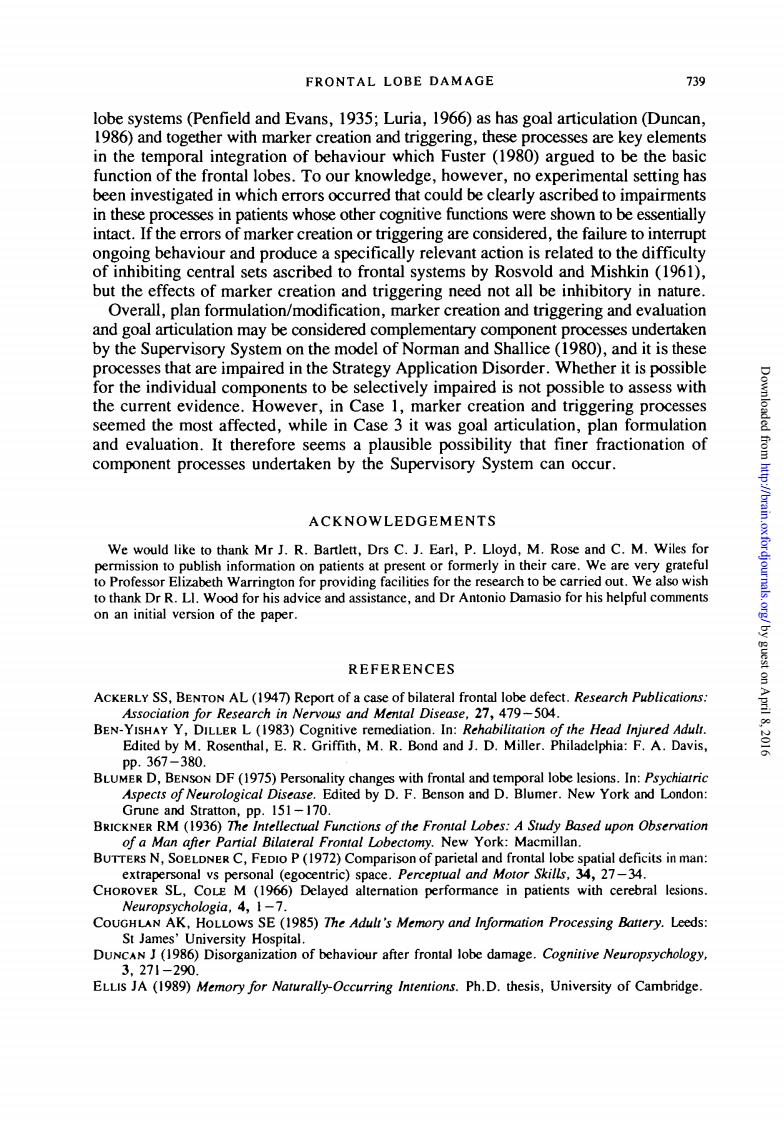正在加载图片...

FRONTAL LOBE DAMAGE 739 lobe systems (Penfield and Evans,1935;Luria,1966)as has goal articulation(Duncan 1986)and together with marker creation and triggering,these rocesses are key elements in the temporal integration of behaviour which Fuster (1980)argued to be the basic function of the frontal lobes.To our knowledge,how ever.no experimental set ting has been investigated in which errors occurred that could be clearly as ents in these esses in patients whose other cognitive functions were shown to be esse ntially rs of marker creation or tri ggering are considered,the failure to inte r and n evant action is related to the difficulty old and Mishkin (1961) but the effects of marker creation and trigg ing need not all be inhibitory in nature Overall,plan formulation/modification marke creation and triggering and evaluati and goal arti onsidered comnler entary co s undertaker by the sur on the t nodel of Norman and Shallice (1980).and it is the esses that are i paired in the strate to be selectiv pp lication Disorder.Whether it is possible aired is not nossible to as ss with the current evidenc marker creation and trigg seemed the most affect ed.while in Case 3 it was goal articulation nlan fo mulation and evaluation.It the s a plausible ssibility that fine fractionation of component processes unde rtaken by the sune visory Sys stem can occur ACKNOWLEDGEMENTS We would like to thank Mr I R.Bartlett.Drs C.J.Earl.P.Lloyd.M.Rose and C.M.Wiles fo Ppmisioopwbih6mtionCaaiensprs nt or formerly in their care.We are ry gratefu nd Dth io D n to on an initial version of the paper REFERENCES e of bil erlfo2l4ogd6.ResarchPublicaion BEN-YISHAY Y,DILLER L(1983)Co on of the Head Injured Adulr Rosenthal,E.R.Griffith,M.R.Bond and J.D.Miller.Philadelphia:F.A.Davis, with frontal and temporal lobe lesions.In:Psychiatri Edited by D.F.Benson and D.Blumer.New York and London: Macmillan BUTT traner sonal (e M)Delaycd performance in patinshn SE(15)The Adal's Memory and Baery.Lds St Jame of behaviour after frontal lobe damage.Cognirive Neuropsychology ELLIS JA (1989)Memory for Naturally-Occurring Intentions.Ph.D.thesis,University of Cambridge FRONTAL LOBE DAMAGE 739 lobe systems (Penfield and Evans, 1935; Luria, 1966) as has goal articulation (Duncan, 1986) and together with marker creation and triggering, these processes are key elements in the temporal integration of behaviour which Fuster (1980) argued to be the basic function of the frontal lobes. To our knowledge, however, no experimental setting has been investigated in which errors occurred that could be clearly ascribed to impairments in these processes in patients whose other cognitive functions were shown to be essentially intact. If the errors of marker creation or triggering are considered, the failure to interrupt ongoing behaviour and produce a specifically relevant action is related to the difficulty of inhibiting central sets ascribed to frontal systems by Rosvold and Mishkin (1961), but the effects of marker creation and triggering need not all be inhibitory in nature. Overall, plan formulation/modification, marker creation and triggering and evaluation and goal articulation may be considered complementary component processes undertaken by the Supervisory System on the model of Norman and Shallice (1980), and it is these processes that are impaired in the Strategy Application Disorder. Whether it is possible for the individual components to be selectively impaired is not possible to assess with the current evidence. However, in Case 1, marker creation and triggering processes seemed the most affected, while in Case 3 it was goal articulation, plan formulation and evaluation. It therefore seems a plausible possibility that finer fractionation of component processes undertaken by the Supervisory System can occur. ACKNOWLEDGEMENTS We would like to thank Mr J. R. Bartlett, Drs C. J. Earl, P. Lloyd, M. Rose and C. M. Wiles for permission to publish information on patients at present or formerly in their care. We are very grateful to Professor Elizabeth Warrington for providing facilities for the research to be carried out. We also wish to thank Dr R. LI. Wood for his advice and assistance, and Dr Antonio Damasio for his helpful comments on an initial version of the paper. REFERENCES ACKERLY SS, BENTON AL (1947) Report of a case of bilateral frontal lobe defect. Research Publications: Association for Research in Nervous and Mental Disease, 27, 479—504. BEN-YISHAY Y, DILLER L (1983) Cognitive remediation. In: Rehabilitation of the Head Injured Adult. Edited by M. Rosenthal, E. R. Griffith, M. R. Bond and J. D. Miller. Philadelphia: F. A. Davis, pp. 367-380. BLUMER D, BENSON DF (1975) Personality changes with frontal and temporal lobe lesions. In: Psychiatric Aspects of Neurological Disease. Edited by D. F. Benson and D. Blumer. New York and London: Grune and Stratton, pp. 151-170. BRICKNER RM (1936) The Intellectual Functions of the Frontal Lobes: A Study Based upon Observation of a Man after Partial Bilateral Frontal Lobectomy. New York: Macmillan. BUTTERS N, SOELDNER C, FEDIO P (1972) Comparison of parietal and frontal lobe spatial deficits in man: extrapersonal vs personal (egocentric) space. Perceptual and Motor Skills, 34, 27—34. CHOROVER SL, COLE M (1966) Delayed alternation performance in patients with cerebral lesions. Neuropsychologia, 4, 1 —7. COUGHLAN AK, HOLLOWS SE (1985) The Adult's Memory and Information Processing Battery. Leeds: St James' University Hospital. DUNCAN J (1986) Disorganization of behaviour after frontal lobe damage. Cognitive Neuropsychology, 3, 271-290. ELLIS JA (1989) Memory for Naturally-Occurring Intentions. Ph.D. thesis, University of Cambridge. by guest on April 8, 2016 http://brain.oxfordjournals.org/ Downloaded from